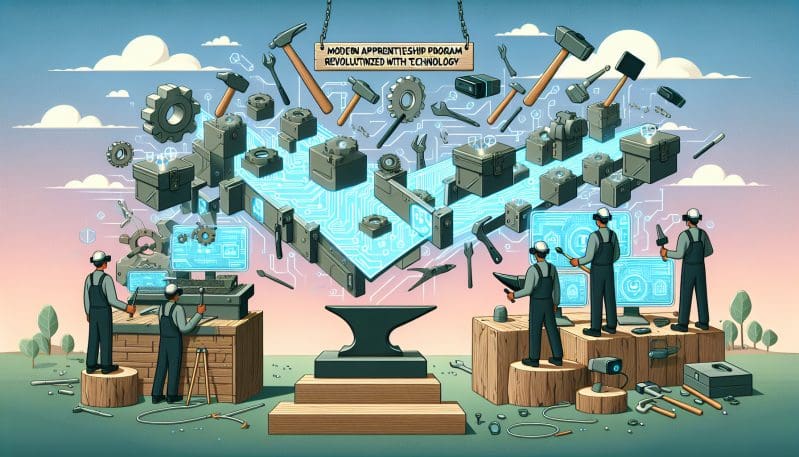Bridging the Skills Gap: Can Technology Revolutionize Apprenticeship Programs?
- Home
- Bridging the Skills Gap: Can Technology Revolutionize Apprenticeship Programs?

- Editors Desk
- February 16, 2024
- 0 Comments
In the shadow of a swiftly transforming global economy, there exists a palpable tension between the skillsets job seekers bring to the table and the advanced competencies employers demand. This gap, perilous to both worker security and business innovation, beckons for a solution that is as robust as it is agile. Apprenticeship programs, time-honored bridges between educational endeavors and gainful employment, have long been instrumental in preparing the workforce for the demands of the job market. Yet, against a backdrop of rapid technological innovation, these programs are often criticized for their perceived inertia. The vital question now surfaces: can the pillars of technology—Artificial Intelligence (AI), Augmented Reality (VR), and mobile ecosystems—usher in a renaissance for apprenticeship education, transforming it into a bastion of modernity and relevance?
As we delve into this inquiry, we observe the emergence of AI-driven personalized learning pathways and the immersive experiences offered by AR and VR as potential harbingers of a new age for apprenticeships. These technologies promise to render training more adaptable to individual learning paces, more reflective of real-world scenarios, and more accessible regardless of geographical constraints. The traditional, one-size-fits-all approach to apprenticeship is being challenged by a tech-infused pedagogy that values customization and interactivity.
Consider, for instance, the use of VR to simulate complex technical tasks in the safety of a virtual environment, allowing apprentices to hone their skills without the risks associated with on-the-job training. Or the deployment of AI to curate personalized learning modules, responsive to the evolving strengths and weaknesses of each learner. Mobile platforms, too, play a pivotal role by democratizing access to educational content, providing a gateway for continuous learning beyond the confines of physical classrooms and workshops.
We must also turn our attention to real-world exemplars. Case studies from industries ranging from manufacturing to healthcare illustrate the successful integration of these technologies within apprenticeship programs. Take, for example, a manufacturing apprenticeship where AI and real-time data analytics have enabled a deeper understanding of machinery processes, resulting in a more proficient workforce. Or a medical training program where VR has been employed to simulate surgical procedures, thereby amplifying the confidence and competence of future healthcare providers.
Yet, while the advent of these innovations stirs optimism, it is incumbent upon us to scrutinize the challenges and implications they introduce. There are concerns about the digital divide and the need for substantial infrastructure investments, questions about the readiness of both trainers and trainees to adapt to new technologies, and the broader issue of ensuring these advanced apprenticeship models do not exacerbate existing inequalities within the workforce.
Despite these hurdles, the potential of tech-enhanced apprenticeships to captivate a wider audience is undeniable. Much like the esteemed readership of The Washington Post, The New Yorker, and The New York Times, a diverse demographic of learners stands to be engaged by this forward-thinking approach to vocational education. By addressing the multifaceted needs of the contemporary workforce and employing the allure of innovation, we are not only equipping individuals with the skills of tomorrow but redefining what it means to be apprentices in a world where perpetual learning is not just encouraged—it is essential.
As policymakers, educators, employers, and workers contemplate the intersection of technology and apprenticeship, the foundational question persists: can these tech-infused training models be the catalyst for a workforce revolution? If so, we are on the precipice of a new epoch, one in which the apprenticeship is not merely a relic of a bygone era but a dynamic vehicle propelling us toward an auspicious future of work.
Choose Layout
Main Color Scheme
- RTL Version
- LTR Version
